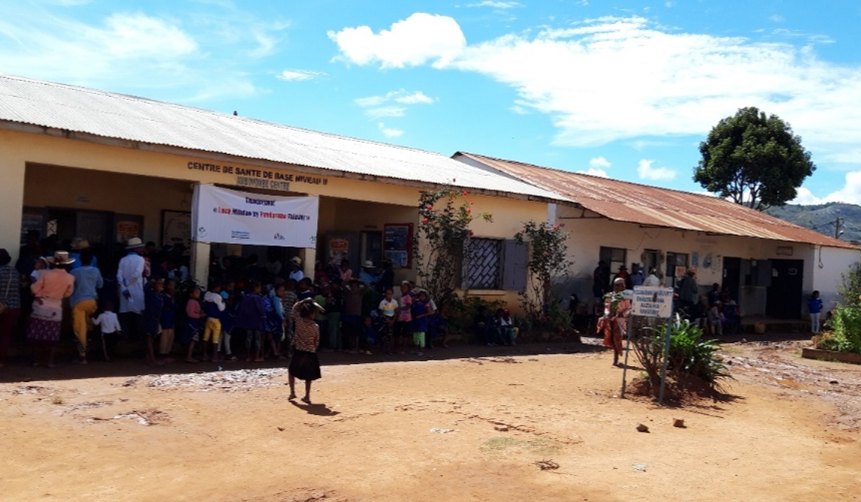Ten-day course of antibiotics found to be highly effective for treating bubonic plague in world-first clinical trial
Researchers from the UK and Madagascar have conducted the world's first rigorous clinical trial of treatments for bubonic plague.
The trial was a collaboration between researchers from the University of Oxford, Institut Pasteur de Madagascar, Centre Hospitalier Universitaire Joseph Raseta Befelatanana, Centre d'Infectiologie Charles Mérieux, London School of Hygiene & Tropical Medicine, along with Madagascar's health services and national plague programme.
The findings provide robust evidence of the efficacy and safety of two treatment regimens for bubonic plague. Both regimens were found to be highly effective and safe, with overall treatment success rates of about 90% and an overall mortality rate of about 4%.
It also found that the ten-day course of an oral antibiotic (ciprofloxacin), which can be taken at home, was a highly effective and safe alternative to treatment with injectable antibiotics in hospital. The oral antibiotic treatment course costs approximately one-tenth of the existing treatment regimen and would alleviate the need for beds in already-stretched hospitals.
The full findings are published in the New England Journal of Medicine.
Bubonic plague is an infection caused by the bacteria Yersinia pestis, usually found in small mammals and their fleas. It causes a fever illness and large swollen lymph nodes referred to as "Buboes". If left untreated, it can lead to secondary pneumonic plague and if the infection gets into the blood, life-threatening septicaemia. It has a mortality rate ranging from 15 to 25%.
Although bubonic plague is typically associated with major epidemics like the Black Death, there continue to be sporadic cases of plague every year, with the majority (80%) of cases reported from Madagascar and several across the USA. Although transmission has been declining globally, it remains a high-threat pathogen of pandemic potential, due to its widespread animal reservoir and potential for being weaponised.
The trial was conducted over five years in rural Madagascar and enrolled 450 patients with clinically suspected bubonic plague between 2020 and 2024. Of these, 222 plague infections were confirmed by laboratory testing.
Patients were randomly allocated to receive either a ten-day oral regimen of ciprofloxacin (an antibiotic tablet which can be taken at home), or a regimen requiring three days' injectable gentamicin followed by seven days' ciprofloxacin, (with the intravenous (IV) therapy requiring patients to be hospitalised).
With many cases occurring in remote villages and the location of outbreaks being unpredictable, the team deployed dozens of research assistants, and trained over 230 local doctors and nurses and 1300 village health workers. The trial was embedded within Madagascar's national health service and conducted with the support of the Ministry of Public Health.
Although there are already some treatment options recommended for treating bubonic plague in Madagascar's and international treatment guidelines, these have largely been based on animal studies.

Tansy Edwards, Associate Professor at the London School of Hygiene & Tropical Medicine (LSHTM), who worked closely with partners on the trial to collate and analyse the findings, said: "Our landmark trial, conducted in field conditions at health facilities ranging from the most rural to district and regional hospitals, is the first to generate real-world, robust evidence of the efficacy and safety of two treatments for plague.
"There are many challenges to conducting trials in remote rural settings in accordance with rigorous international standards, and it can be extremely hard to design a trial looking at the safety and efficacy of treatments for a disease when cases are typically low. As a result, there had not been a randomized controlled trial in humans that had managed to recruit the target sample size before.
"The success of this trial is a reflection of the tremendous support and efforts of health professionals in Madagascar. I'm incredibly proud to have been able to work alongside them on this research."
Mihaja Raberahona, physician at CHU Joseph Raseta Befelatanana and researcher at the Centre d'Infectiologie Charles Mérieux Madagascar said, "In Madagascar, where plague cases occur in remote rural locations with limited healthcare infrastructure, taking a straightforward oral antibiotic is vastly preferable to a treatment requiring injections. It alleviates healthcare worker workload and is also much cheaper - costing about one-tenth of the current treatment regimen."
Rindra Vatosoa Randremanana, Medical epidemiologist at Institut Pasteur de Madagascar said "The trial was a massive operational undertaking. Many patients were in remote villages and the unpredictable nature of the outbreaks made the research very challenging. Recruiting the 450 patients, of whom about half were confirmed with bubonic plague, took five plague transmission seasons and an army of research assistants, doctors and community health workers. We are hugely grateful to everyone who took part."
Piero Olliaro, Professor at the Pandemic Science Institute, University of Oxford and senior author of the study said, "Despite its deadly history, we've had little clinical evidence on treating bubonic plague-until now. Thanks to the patients and healthcare workers in the trial, we now have real-world proof of effective, safe treatment. Ongoing data analysis will deepen our understanding of the disease, including risk factors, symptoms, and diagnostics."
This story is based on an original press release by the University of Oxford.
Publication
Randremanana RV et al. Ciprofloxacin versus Aminoglycoside-Ciprofloxacin for Bubonic Plague. NEJM. DOI: 10.1056/NEJMoa2413772.






